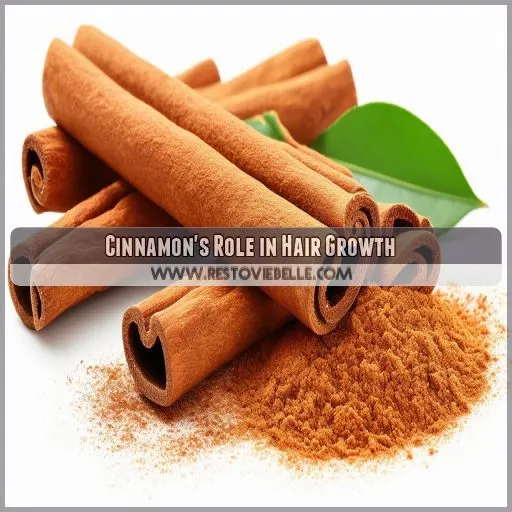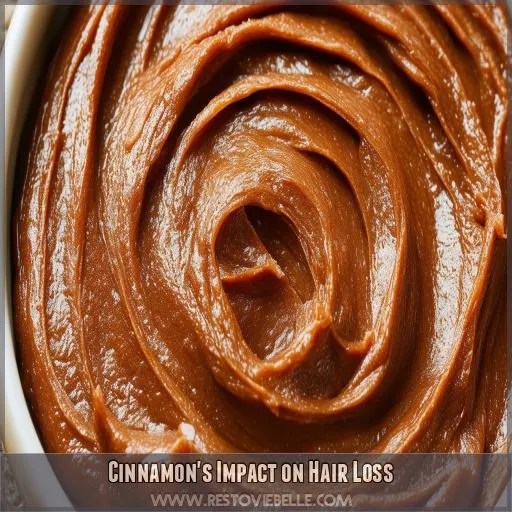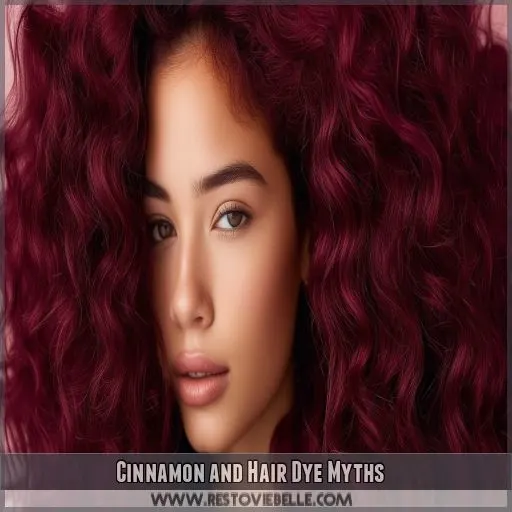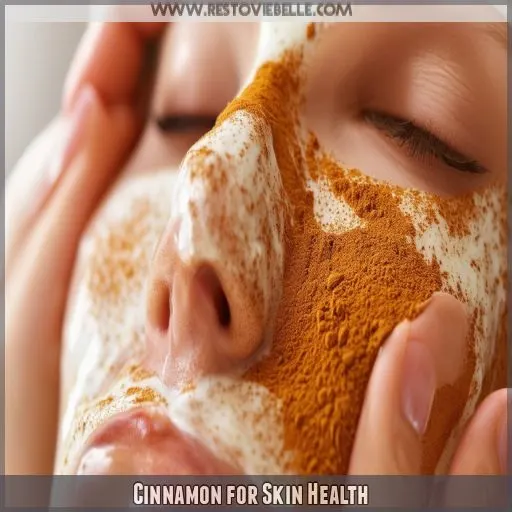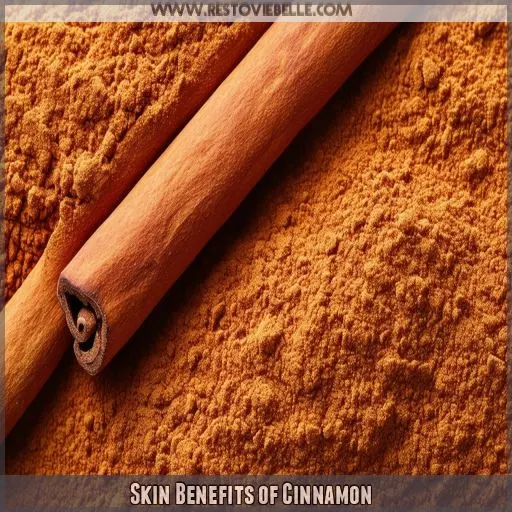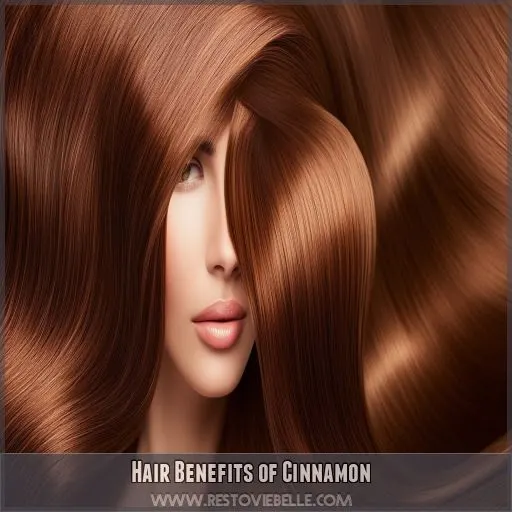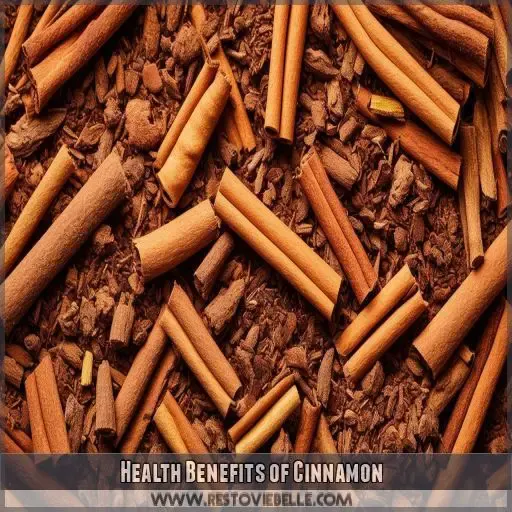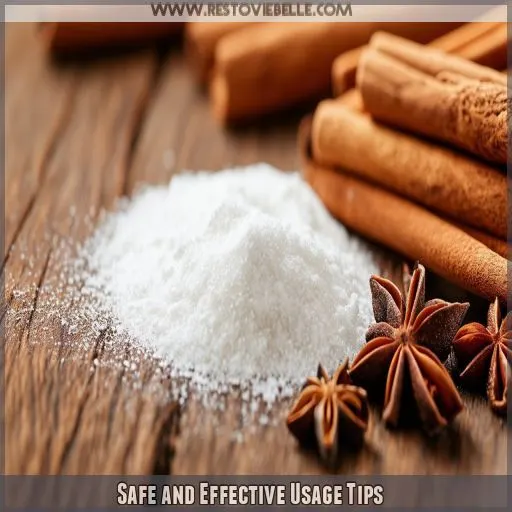This site is supported by our readers. We may earn a commission, at no cost to you, if you purchase through links.

From promoting hair growth to fighting fungal infections, cinnamon’s antioxidant and antimicrobial properties may offer a natural solution for common hair and skin concerns.
Explore the science-backed benefits of cinnamon and how to safely incorporate this versatile ingredient into your beauty routine.
Table Of Contents
- Key Takeaways
- Cinnamon’s Role in Hair Growth
- Cinnamon’s Impact on Hair Loss
- Cinnamon and Hair Dye Myths
- Antifungal Properties of Cinnamon for Dandruff
- Cinnamon for Skin Health
- Skin Benefits of Cinnamon
- Hair Benefits of Cinnamon
- Health Benefits of Cinnamon
- Safe and Effective Usage Tips
- Frequently Asked Questions (FAQs)
- Does cinnamon help your hair grow?
- Is cinnamon good for skin and hair?
- Can I apply cinnamon on my face daily?
- Is cinnamon good for wrinkles?
- How should you store cinnamon products?
- Can cinnamon be used during pregnancy?
- Is cinnamon consumption safe for pets?
- Does cinnamon interact with other medications?
- Are there different types of cinnamon available?
- Conclusion
Key Takeaways
- Cinnamon, once more precious than gold, now offers a treasure trove of benefits for your crowning glory and skin.
- This ancient spice has a knack for stimulating hair growth, reducing hair loss, and keeping dandruff at bay.
- Cinnamon’s got your skin covered too, with its antioxidant and antimicrobial powers working their magic against acne, eczema, and wrinkles.
- Remember, moderation is key, so don’t go overboard and end up with a cinnamon-spiced disaster!
Cinnamon’s Role in Hair Growth
You may be able to promote healthier hair growth with the help of cinnamon. Its active compounds like procyanidin and cinnamaldehyde show promise in stimulating hair follicles.
In fact, procyanidin from apple juice has demonstrated positive effects on hair growth. Similarly, cinnamon oil increased hair length in male rats as effectively as the popular hair loss treatment minoxidil.
The cinnamaldehyde in cinnamon may boost circulation and blood flow to the hair follicles, nourishing them for optimal growth. While more research is needed, cinnamon could be a natural solution for fuller, stronger hair.
Cinnamon’s Impact on Hair Loss
As you explore the benefits of cinnamon for hair, it’s crucial to understand its impact on hair loss. Cinnamaldehyde, a component in cinnamon, may boost blood circulation to hair follicles, essential for combating hair loss issues like androgenetic alopecia. Increased blood flow can nourish follicles, potentially reducing hair loss in both male and female pattern baldness. Improving scalp health through enhanced blood circulation promotes optimal hair health, minimizing damage.
- Hair follicle health
- Enhanced blood circulation
- Reduction of hair loss
- Scalp cleansing properties
Cinnamon and Hair Dye Myths
Continuing from reducing hair loss, let’s tackle the cinnamon hair dye myths. Although some claim cinnamon can change blond to strawberry blond or lighten dark brown hair, there’s no scientific backing. Its supposed lightening effect is purely anecdotal.
| Myth | Truth |
|---|---|
| Natural Dye | No scientific evidence |
| Safe Coloring | Can cause skin irritation |
| Consistent Results | No proven efficacy |
| Long-lasting | Fades quickly |
| Hair Health | Potential for hair damage |
Antifungal Properties of Cinnamon for Dandruff
Cinnamon’s antifungal properties make it a promising natural remedy for dandruff. The fungus Malassezia is a common culprit behind this pesky scalp condition. Cinnamon’s potent antioxidants and antimicrobial compounds can help fight this fungus, potentially soothing inflammation and reducing flaky, itchy buildup. While more research is needed, early studies suggest cinnamon may be an effective, gentle alternative to conventional dandruff treatments. Just be mindful of potential skin irritation, and always do a patch test before applying cinnamon directly to the scalp.
- Cinnamon’s antifungal properties can combat the Malassezia fungus that causes dandruff.
- Cinnamon’s antioxidants and antimicrobial compounds may help soothe inflammation and reduce flaky buildup.
- Proceed with caution, as cinnamon can potentially cause skin irritation, and a patch test is recommended.
Cinnamon for Skin Health
Cinnamon is rich in antioxidants, which help fight cell-damaging free radicals that can affect your skin health. While there’s no conclusive scientific evidence yet, applying cinnamon topically may offer multiple benefits, but be cautious of potential side effects like skin irritation.
Cinnamon’s Antioxidants and Skin Health
Cinnamon’s antioxidants fight free radicals, promoting overall skin health and helping reduce signs of aging. Its polyphenols support collagen synthesis, which can improve skin elasticity and firmness.
However, while these benefits are promising, cinnamon derivatives can also cause skin irritation or inflammation in some individuals. Use caution, particularly with sensitive skin.
Incorporating cinnamon into your routine may offer skin lightening and hyperpigmentation benefits, enhancing your complexion over time.
Specific Skin Benefits of Cinnamon
Cinnamon’s skin-boosting benefits go beyond just antioxidants. Ceylon cinnamon extract may promote collagen synthesis, supporting skin elasticity. Additionally, cinnamon’s antifungal properties could help treat acne, eczema, and other skin conditions. Some even claim cinnamon can enhance complexion and provide a subtle lip-plumping effect. Explore these potential skin-nourishing powers of this versatile spice.
Risks of Using Cinnamon for Skin Care
Using cinnamon for skin care has potential risks. Cinnamon allergy can lead to reactions like rashes and burning. DIY cinnamon skincare might cause skin irritation if not properly diluted.
Patch test safety is crucial to avoid adverse effects. Even commercial products can pose risks, leading to skin irritation concerns.
Always perform a patch test before using, ensuring you avoid any harmful reactions with cinnamon.
Skin Benefits of Cinnamon
Cinnamon offers several skin benefits, including supporting collagen synthesis and potentially treating acne. Its antifungal properties may also help manage skin conditions, although you should exercise caution due to potential irritation.
Collagen Synthesis Benefits
The antioxidant-rich Ceylon cinnamon may support collagen synthesis, a key component of healthy, youthful skin. Its active compounds like cinnamaldehyde can stimulate fibroblasts to produce more collagen, improving skin elasticity and reducing the appearance of fine lines. Topical cinnamon extracts have also shown promising wound healing effects, making it a potential natural anti-aging solution for the skin.
Acne Treatment Potential
Cinnamon can help treat acne by reducing skin inflammation and irritation. Creating a cinnamon paste or using cinnamon powder can be beneficial. Here’s how:
- Face Masks: Mix cinnamon powder with honey to apply on acne-prone areas.
- Spot Treatment: Apply a small amount of cinnamon paste directly to pimples.
- Anti-Inflammatory: Benefits from its anti-inflammatory properties.
- Antibacterial: Targets bacteria causing skin issues.
Antifungal Properties Insight
Harnessing cinnamon’s antifungal properties can help you tackle dandruff. Cinnamon combats Malassezia, a common fungus causing dandruff, thanks to its potent antifungal capabilities. Incorporating cinnamon into your routine may provide a natural remedy for a healthier scalp.
The table underscores cinnamon’s synergy in enhancing your scalp health and preventing excess dandruff.
Hair Benefits of Cinnamon
Cinnamon may stimulate hair growth by improving circulation to the hair follicles. Its antifungal properties also make it a potential natural remedy for dandruff, which can contribute to hair loss.
Hair Growth Potential
Cinnamon shows promising hair growth potential due to procyanidin, a compound found in apple juice, with similar effects as minoxidil. Here are three benefits of using cinnamon for hair growth:
- Procyanidin: Encourages hair growth and supports healthy hair follicles.
- Cinnamaldehyde: Enhances hair length by improving circulation and blood flow to hair follicles.
- Scientific Comparison: Studies reveal cinnamon oil matches minoxidil in promoting hair length in male rats.
Circulation and Hair Health
The circulation-boosting effects of cinnamaldehyde in cinnamon can increase blood flow to your hair follicles. Improved blood flow means better delivery of essential nutrients, which are crucial for promoting hair growth and maintaining healthy follicles.
Dandruff Treatment Possibilities
Cinnamon’s antifungal properties make it a promising natural remedy for dandruff. The active compound cinnamaldehyde can inhibit the growth of Malassezia, the fungus that causes flaky, itchy scalp. By improving scalp circulation, cinnamon extract may also nourish hair follicles and reduce excess shedding. While more research is needed, cinnamon shows potential as an effective, gentle solution for managing stubborn dandruff.
Health Benefits of Cinnamon
Cinnamon promotes hair growth by stimulating blood flow to your hair follicles and reducing hair loss with its circulation-enhancing properties. Its antifungal power makes it a natural solution for dandruff, contributing to healthier scalp and hair.
Promotes Hair Growth
Recent studies highlight cinnamon’s promise in promoting hair growth, similar to minoxidil. Procyanidin benefits from apple juice, alongside cinnamaldehyde circulation enhancement, are vital.
While male rats showed increased hair length from cinnamon oil, more human studies are necessary. Female hair growth effects need deeper exploration.
It’s essential to consider these findings and remain hopeful for comprehensive research to confirm cinnamon’s potential in stimulating hair growth.
Reduces Hair Loss
Cinnamon’s cinnamaldehyde may also reduce hair loss by improving circulation and blood flow to hair follicles. Healthy hair follicles need ample blood and nutrients to thrive, and cinnamaldehyde’s vasodilating effects could increase this vital supply. While more research is needed, this natural compound may help curb excessive shedding, especially in older individuals whose hair growth slows over time.
Natural Dandruff Solution
Building on its ability to reduce hair loss, cinnamon’s antifungal properties make it a promising natural dandruff solution. The spice combats Malassezia, a fungus behind dandruff, offering a holistic alternative to chemical treatments.
- Antifungal properties: Fight dandruff-causing fungus
- Natural remedies: Safer than synthetic options
- Improves scalp health: Reduces itchiness
- Encourages hair growth: Better scalp environment
- Easy application: Use in homemade treatments
Safe and Effective Usage Tips
Ensuring the safe and effective use of cinnamon for skin and hair care is crucial. Here are practical tips to consider:
- Patch Test: Before using any homemade remedies, perform a patch test to check for skin irritation or a cinnamon allergy.
- Diluting Cinnamon: Always dilute cinnamon oil before applying it to avoid burns.
- Avoid Overuse: Excessive use can lead to skin irritation.
- Monitor Reactions: Watch for any adverse reactions and discontinue use if necessary.
These precautions help maximize benefits while minimizing risks.
Frequently Asked Questions (FAQs)
Does cinnamon help your hair grow?
Cinnamon may help hair growth due to procyanidin and cinnamaldehyde, both promoting circulation and blood flow to hair follicles. However, more research is needed, especially involving humans, to confirm these potential benefits.
Is cinnamon good for skin and hair?
Cinnamon can be beneficial for your skin and hair. Its antioxidant and antimicrobial properties may help treat acne, soothe dry skin, and stimulate hair growth. However, use caution as it can cause irritation in some people.
Can I apply cinnamon on my face daily?
It’s not advisable to apply cinnamon on your face daily. Cinnamon can cause skin irritation, redness, and burns. Always do a patch test and dilute cinnamon oil before use to minimize adverse effects.
Is cinnamon good for wrinkles?
Yes, cinnamon is good for wrinkles as compounds in Ceylon cinnamon extract support collagen synthesis and may improve skin texture. Always do a patch test due to potential skin irritation and sensitivity.
How should you store cinnamon products?
To store cinnamon products, keep them in an airtight container in a cool, dark place. This helps preserve the flavor and aroma. Avoid exposing cinnamon to heat, light, or moisture for best results.
Can cinnamon be used during pregnancy?
You should avoid cinnamon oil during pregnancy due to potential skin irritation and possible allergic reactions. Consuming small amounts in food is generally safe, but always consult your healthcare provider before using any supplements.
Is cinnamon consumption safe for pets?
No, cinnamon consumption isn’t safe for pets. It can cause gastrointestinal irritation, liver damage, and even toxicity at high doses. Always consult your vet before introducing new foods to your pet’s diet.
Does cinnamon interact with other medications?
Cinnamon may interact with certain medications, like blood thinners and diabetes drugs. Always consult your healthcare provider before using cinnamon supplements, especially if you take prescription medications. Moderation is key when incorporating cinnamon into your routine.
Are there different types of cinnamon available?
Yes, there are different types of cinnamon: Ceylon (True cinnamon) and Cassia. Ceylon contains more health-promoting antioxidants, while Cassia is more commonly used but contains fewer polyphenols. Select based on your needs.
Conclusion
Interestingly, cinnamon’s historical value aligns with its modern benefits for skin and hair.
Its antioxidant and antimicrobial properties make it a powerful tool in your beauty routine.
You can witness improved hair growth, reduced hair loss, and clearer skin by integrating cinnamon carefully.
Enjoy the natural advantages of this ancient spice.

